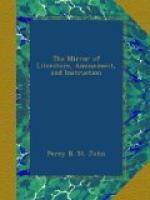Just before the abolition of this party-coloured tribunal, a wag who was fond of music, but who had more wit than money, appeared at the gallery door, when the porter demanded the name of his master. The wag boldly answered, “I am the Lord Jehovah’s servant,” and was admitted, one of the door-keepers saying to the other, “I never heard of that man’s master before, but suppose it is some scurvy Scotch lord or other.”
New Reading.
Mr. John Kemble used to relate many whimsical anecdotes of provincial actors whom he knew in the early part of his life. He said that an actor who was to perform the character of Kent in the play of “King Lear,” had dressed himself like a doctor, with a large grizzle wig, having a walking-stick, which he held up to his nose, and a box under his arm. Being asked why he dressed the Earl of Kent in that manner, he said, “People mistake the character; he was not an earl, but a doctor. Does not Kent say, when the king draws his sword on him for speaking in favour of Cordelia, ‘Do kill thy physician, Lear;’ and when the king tells him to take his ‘hated trunk from his dominions,’ and Kent says, ‘Now to new climes my old trunk I’ll bear,’ what could he mean but his medicine chest, to practise in another country?”
Absence.
The first Lord Lyttleton was very absent in company, and when he fell into a river, by the oversetting of a boat, at Hagley, it was said of him that he had “sunk twice before he recollected he could swim.” Mr. Jerningham told me, that dining one day with his lordship, the earl pointed to a particular dish, and asked to be helped of it, calling it, however, by a name very different from what the dish contained. A gentleman was going to tell him of his mistake. “Never mind,” whispered another of the party; “help him to what he asked for, and he will suppose it is what he wanted.”
Arthur Murphy, whose mind was chiefly occupied by dramatic subjects, after he became a barrister, dining one Sunday at the chaplain’s table, St. James’s Palace, being too early, strolled into the Chapel Royal during the service, and desiring a seat, he thus addressed one of the attendants on the pews, “Here, boxkeeper, open this box.”
* * * * *
MANNERS AND CUSTOMS.
* * * * *
CURIOUS LAWS RELATING TO CAPS.
In England, in the year 1571, it was enacted, “that every person above seven years of age should wear on Sundays and holidays a cap of wool, knit-made, thickened and dressed in England, by some of the trade of cappers, under the forfeiture of three farthings for every day’s neglect, excepting maids, ladies, and gentlewomen, and every lord knight, and gentleman, of twenty marks of land, and their heirs, and such as have borne office of worship in any city, town, or place, and the wardens of the London Companies.”




